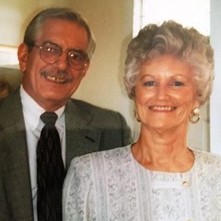By Jim Cofer
Vice President, Gwinnett Historical Society
SNELLVILLE, Ga. | Many in the Snellville community will remember (Curtis) Brooks Tuck (shown with wife, Shirley), who grew up on Hewatt Road in the 1940-50s, the son of Arthur and Katie Mae Tuck. He was a 1956 graduate of Snellville Consolidated School.
Brooks and I are distant cousins, since our grandmothers were sisters in the large Hannah family whose plantation lay at the intersection of Killian Hill Rd. and U.S. Highway 78, just east of Snellville. The Hannahs moved into Gwinnett in 1840s.
Brooks was a kind-hearted and sensitive young man who accepted a call to the ministry at our home church (Bethany Baptist) in the 1950s. He graduated from Mercer University; then earned M. Ed. and Ed S. degrees from UGA. He pastored several churches including Beaver Ruin Baptist and a church in Luthersville. He married Shirley Ann Knight, and had one child, Mike. Later, Brooks entered public education, becoming a teacher and eventually a principal.
Prior to the 1954 Supreme Court decision, Georgia’s schools were separate and usually unequal for white and black children. By 1966, Henry County had made no progress in school desegregation, therefore, the courts ordered that one Henry County school would be integrated that year. Brooks Tuck was a young principal at Fairview Elementary, the most rundown of Henry County’s white schools. He stepped forward and volunteered Fairview as that test school. Community reaction was very negative, with his family receiving death threats, bomb scares, crank calls, etc.
When given the opportunity to attend Fairview, only 13 black families responded positively by sending their children. As the bus carrying the 13 children arrived at Fairview, an angry mob of white protesters lined the street to the school. The black children were afraid. Insulted and threatened by the crowd, Brooks made his way to the bus, stepped into it, welcomed the children, and told them “We are going to get through this together.”
Then he took the first little girl by the hand and escorted her into the school. He returned to the bus 12 times escorting each child, carrying some of the smaller ones in his arms, until all 13 were safely inside. The next few weeks and months were difficult for Brooks and the 13, but things did get better gradually.
Many years later, Mr. Tuck became sick and was hospitalized. He was often in and out of consciousness and not always aware of goings on around him. But one thing he did notice. An African American nurse spent a lot of time by his bedside, even after her shift was over. When he inquired who she was and why she didn’t go home to her family, she replied, “Mr. Tuck, you don’t know me, but I sure do know you. You held my hand and walked me to my first day at Fairview Elementary. You didn’t leave me on that day, and I’m not leaving you. We’re going to get through this together.”
In 2010, Mercer University conferred on Brooks Tuck the Doctor of Humanities degree, in recognition of his life of service to education. In his commencement address that day, he told for the first time publicly the story of the 13 heroes. Brooks passed away from liver cancer in 2012; his wife Shirley joined him in death in 2018. A book documenting his life and service, “Mr. Tuck and the 13 Heroes,” by John Harris, is available from Regeneration Writers Press, LLC, or from Amazon.
- Have a comment? Send to: elliott@brack.net










Follow Us